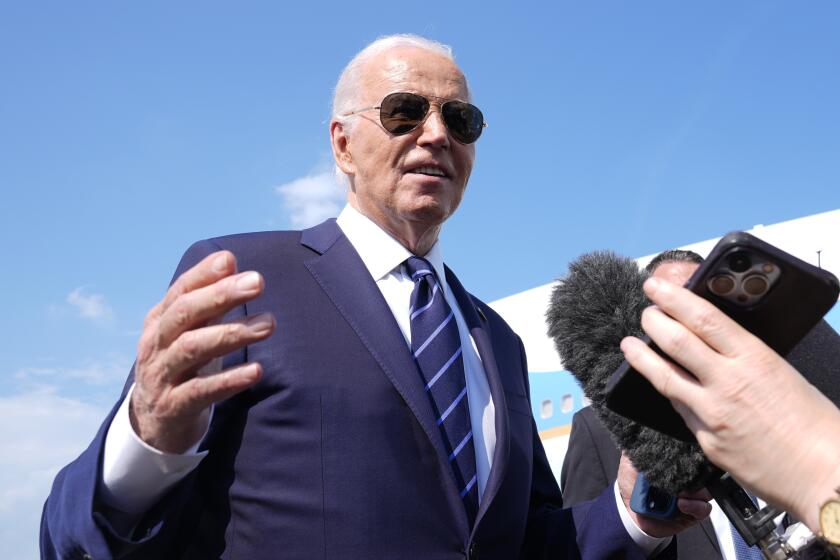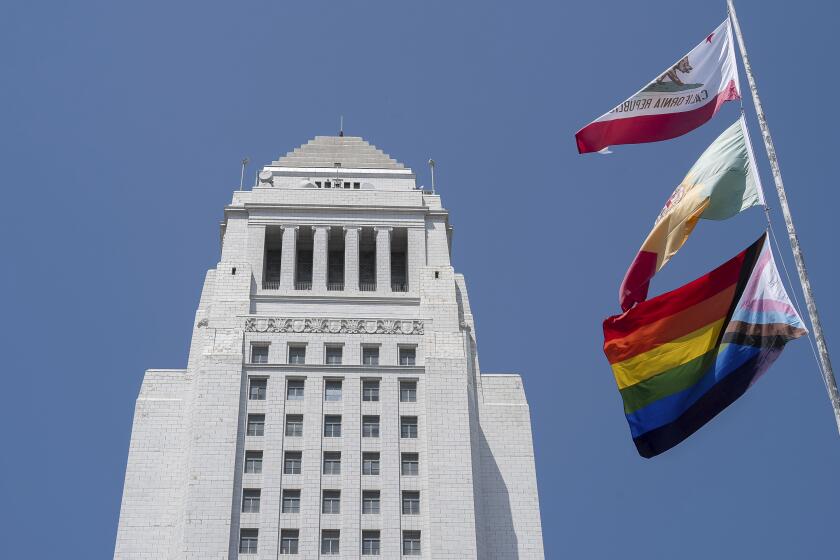U.S. Sanctions in Homeland Split Iranians
Alireza Mahdavi had barely returned home to Westwood from his native Iran when a cousin embroiled him in a familiar, passionate debate, one rocking the Iranian diaspora across the country.
Mahdavi hopes the United States will lift the economic sanctions it placed on Iran. His cousin wants them to stay.
“Over the dinner table, he asked me, ‘Why are you wasting your time going back and forth to Iran, promoting the lifting of sanctions when you could be growing your business in the United States?’ ” recalled Mahdavi, who forwards freight for a living.
Forget love of country, his cousin argued. Iran’s clerics and their bonyads, or “foundations”--which control the economy there--would reap the benefits of normalized trade with the U.S., not the Iranian people.
The conversation ended at an impasse, as it has many times before.
The cousin’s pro-sanction stance was echoed by Congress last week when, despite requests by President Bush for more flexible language, the Senate and House passed a veto-proof, five-year extension of a law curtailing foreign investment in Iran and Libya’s oil and energy sectors. The law, due to expire Sunday, aims to punish the two countries for their support of international terrorism and development of nuclear weapons.
The act is only one of several U.S. policies designed to isolate the Islamic Republic of Iran, unilateral actions criticized by much of the world community as being ineffective.
Still, the 96-2 Senate vote Wednesday and 409-6 vote in the House on Thursday sent an unmistakable message to the White House: The presidential order prohibiting U.S. companies from doing business in Iran and related measures had better remain in place.
That message quickly spread across Persian language broadcasts in the Los Angeles Basin last week, stirring tensions anew within “Tehrangeles,” as the largest expatriate community outside Iran is dubbed. Unlike the Miami-based Cuban exile community, which solidly backs U.S. sanctions against Fidel Castro’s regime, the Iranian community here remains divided. Even though Iranian Americans may agree that Iran’s ruling theocracy should be reformed or dismantled, they differ on the best way to achieve that goal.
“The issue of sanctions is a very emotional, very dividing issue among Iranians all over the United States,” said Elahe Amani of Long Beach, who heads the Coalition of Women from Asia and the Middle East, a grass-roots women’s rights group.
The verbal tussle is particularly intense in Southern California, where dozens of Iranian American activists have launched campaigns for and against normalizing trade and improving ties with the Islamic Republic. Many, like Mahdavi of the Iranian Trade Assn., a San Diego-based group seeking to resume U.S.-Iranian commerce, have shuttled to and from Washington to try to persuade the U.S. government to change its policies.
“There are Iranians who basically want to separate this regime from the people,” Mahdavi said of his pro-sanction counterparts. “What we believe is that it’s the people who will eventually make this regime more moderate.”
Iranian American sparring is driven not only by economics and politics, but by personal pride. Many say they are humiliated by how U.S. shunning of the Islamic Republic since the 1979 American hostage crisis affects Iranians, whether here or back home.
Elderly parents are fingerprinted when they arrive at a U.S. airport; cousins have to travel outside Iran at great expense to take entrance exams for American colleges; friends in Iran pay staggering prices for U.S. merchandise imported by non-American middlemen. A pair of Levi’s jeans, for example, goes for more than 60,000 Iranian tomans, close to half the monthly salary of a civil engineer.
The sanctions also perpetuate the American image of post-shah Iran as a land of turbaned mullahs and churning crowds shouting “Death to America,” despite expatriate Iranian success in assimilating into U.S. business and academic life, said Mohammad Ala, a Cal State Los Angeles professor and vocal opponent of sanctions.
But Mohammad Parvin of Rancho Palos Verdes, an avid sanctions supporter, makes a counter-argument. Normalizing relations without getting the Islamic Republic to end controversial practices--including torture, executions and clerical control of the government and economy--won’t solve problems for Iranians here or in Iran.
Ala, who heads Iranians for International Cooperation, and Parvin, who leads Mission For Establishment of Human Rights, share little common ground on what should happen between the United States and their homeland, but other activists, like Amani, fall somewhere in between.
Amani said she would like to see trade resume, but have U.S.-Iranian government relations hinge on addressing human rights violations by the Islamic Republic. One thing that has got to go, she said, is the practice of stoning women to death for murder or adultery.
“Nations in the 21st century should have relationships with each other, but on fair and equitable ground,” she said.
Pro- and anti-sanction forces claim the other side represents a mere sliver of real Iranian American sentiment about relations with their homeland. They accuse each other of being fanatics, terrorists or traitors to their kind.
Each has mailed the White House and Congress petitions signed by thousands of people in an attempt to bolster its case.
One thing is clear. The sanctions will continue to touch the lives of thousands of Iranians abroad and in America. Subadeh M. Zamanian, a self-described apolitical homemaker from Irvine, is among them.
Zamanian tearfully recounted the 1991 death of her 85-year-old father in Tehran because of a lack of medical supplies after an operation to repair his ulcerated stomach.
Her sister had to go to the black market to buy syringes and medicine. “In Iran, from production to consumption, 10 middlemen are needed, even for shampoo,” Zamanian said. “They keep driving the costs up.
“Economic sanctions do not help get rid of terrorists or force these countries to observe human rights,” said Zamanian, 57. “It only causes people to suffer.”
The Tehran-based cousin of an Iranian broadcaster here insisted it also hurts the United States. “We are buying U.S. technology products from Dubai and Singapore at a much higher price,” said Mohammad Reza, a computer engineer who lives in the Iranian capital. “The United States is losing a good market.”
Azar, a 65-year-old retired bank executive who is visiting the Los Angeles area from Tehran, agreed that the sanctions are hurting people, not governments. But like many Iranians, she’s more upset with general U.S. treatment of her people beyond sanctions.
She recounted her reception 16 months ago by Immigration and Naturalization Service and U.S. Customs officials at Los Angeles International Airport.
It was not her first visit here, but certainly the most humiliating one, said Azar, who, fearing retribution, asked that only her first name be used.
“I had a [U.S.] visa,” she explained. “But they took me into a separate room, took my picture and fingerprinted me.”
Customs agents went through her bags--three times--without explanation, she said.
“The whole experience took more than four hours. I was so upset that if I could have turned around and flown back, I would have,” she said.
The U.S. policy of fingerprinting and photographing arriving Iranian nationals traveling for personal or business reasons dates to 1996, in the wake of the TWA Flight 800 explosion, which was initially suspected of being terrorist-related.
The policy touches the famous as well as unknowns. Acclaimed Iranian director Jafar Panahi, best known for his Oscar-nominated film “The White Balloon,” was detained by immigration officials at John F. Kennedy Airport in April for 12 hours. He had only stopped in New York to change planes while en route from Hong Kong to a Buenos Aires film festival.
“Politics aside, it’s been extremely unfortunate that the fingerprinting requirement prevents many sports and cultural exchanges between Iran and the United States,” said Behrooz Afrakhan, an independent producer from Woodland Hills who spent more than six months working with the U.S. State Department to get the Iranian Persepolis team--the biggest soccer club in Asia--to Los Angeles for a historic tournament.
Such difficulties with the U.S. government, say sanction supporters, are the real problem, not the sanctions themselves.
“The U.S. government should do its utmost to show it supports Iranians,” said Pooya Dayanim, director of the Iranian Jewish Public Affairs Committee, based in Los Angeles. “But that’s separate from sanctions,” which most Iranian Jews support.
Immigration agents “should say, ‘We are doing this because your government is involved in terrorist activities, that this is to protect you.’ But that’s not the way they explain it. They treat everyone coming in as a terrorist.”
But such policies won’t change until U.S.-Iranian trade is restored, said an Iranian American investment banker based in Beverly Hills.
“The extension of sanctions makes the Iranian government more resistant,” said John Farahi, managing director of NewPoint Securities, an investment banking firm. “The almighty dollar is more effective.”
More to Read
Get the L.A. Times Politics newsletter
Deeply reported insights into legislation, politics and policy from Sacramento, Washington and beyond. In your inbox three times per week.
You may occasionally receive promotional content from the Los Angeles Times.






